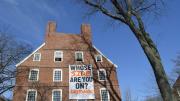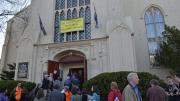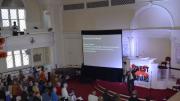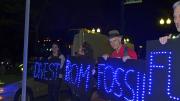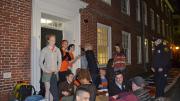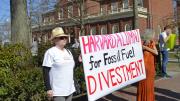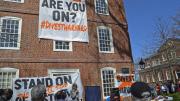Two dozen students from the activist group Divest Harvard blockaded the doors of Massachusetts Hall early on Sunday evening, kicking off a weeklong protest of the University endowment’s continued investment in fossil-fuel companies. Harvard Heat Week—with daily events bringing together students, alumni, faculty, and community members in addition to the planned five-day blockade of President Drew Faust’s office—represents the largest and most coordinated action to date for the two-year-old Divest Harvard movement.
Earlier Sunday evening, more than 150 protesters had gathered across the street for Heat Week’s official launch event, held in the sanctuary of the First Parish in Cambridge. Heat Week, Divest Harvard co-director Talia Rothstein ’17 told the assembled crowd, is a moment of transition for the group, which began in the fall of 2012 with the mission of sparking public discussion among students and administrators about the possibility of divestment. The leaders of Harvard Faculty for Divestment have met privately with Faust and Harvard Corporation senior fellow William F. Lee, and student activists have led smaller-scale protests of Mass. Hall in the past. (A group of 14 occupied the hallways this February, and a student was arrested in connection with the protests last spring.) But, Rothstein explained, with no signs of change in administrators’ positions on divestment, activists felt that collective action on a much larger scale, with combined support of alumni, students, and faculty, was necessary to “shake Harvard University out of its centuries-old institutional slumber.” A recent analysis by the Swiss firm south pole group, conducted at the request of Divest Harvard and the international climate group 350.org, claims that greenhouse-gas emissions from the University’s fossil-fuel-connected holdings equal over “11 million tonnes” of carbon dioxide—roughly equal to all emissions from the state of Rhode Island.
Harvard Heat Week comes in the midst of a busy spring for the fossil-fuel-divestment movement. At Sunday evening’s event, the crowd applauded when 350.org co-founder Bill McKibben ’82 pointed to occupations of administrative buildings at Swarthmore and Yale, and cheered even louder for the decision, announced earlier this month, that Syracuse University would end direct investment in coal and other fossil-fuel companies. McKibben, speaking at a 10 a.m. rally on Monday morning, similarly lauded the leadership at Harvard’s cross-town counterpart: MIT recently held an open forum to debate the pros and cons of divestment.
University administrators have long maintained that Harvard’s proper role in the climate-change movement is to support renewable-energy research and to engage with, rather than divest from, fossil-fuel producers. Activists at Sunday’s launch event questioned whether this strategy has worked. “Is there a single example of successful engagement?” Kelsey Wirth ’91, the founder of the climate group Mothers Out Front, asked the crowd. “Or a single example of Harvard trying to engage these companies in constructive dialogue? I don’t think so.”
Divest Harvard demonstrators have repeatedly called for an open forum on divestment with members of the Corporation and University administrators. The University has sponsored “Climate Week,” which began on April 6; its officially sanctioned events (overlapping in part with Heat Week) culminated with a panel discussion by climate scientists and policy experts on Monday afternoon, moderated by PBS’s Charlie Rose. (Read complete coverage of Monday’s event here.) A University spokesperson did not respond to a request for comment on the presence of ongoing Heat Week protests during the Climate Week panel.
In contrast to the spirited academic discussion of the Sanders event, the atmosphere at the previous night’s Heat Week launch felt like a boisterous revival meeting for climate-action advocates. At the start of the evening, Rev. Fred Small, M.Div. ’99, the senior minister of First Parish, led the audience in a raucous call-and-response sing-along, changing the words of an old sea chantey to the lyrics, “We’ll roll the old fossil fuel below, and we’ll leave it in the ground.” Koreti Tiumalu, a 350.org organizer working in New Zealand, shared testimony of how climate change and the accompanying sea-level rise are affecting Pacific island nations. Shouts and claps punctuated the activists’ speeches—along with hisses and boos for perceived adversaries, from University administrators to Shell Oil.
Throughout their events, activists explicitly drew connections between Heat Week’s efforts and historical protest movements. Several alumni who had been active during the 1970s and 1980s made notable comparisons to the movement to divest from companies doing business with apartheid South Africa. At Monday morning’s rally, David Goodman ’82 began his remarks by noting, “I know I’m back at Harvard when I’m standing at an occupation of Mass. Hall.” Others linked their protests with civil-rights and antiwar demonstrations from the 1960s. Sunday’s launch event ended with a speech, and well-wishes to protesters, by Jibreel Khazan, an original member of the Greensboro Four, who sparked a new phase in the civil-rights movement when they sat down at a Woolworth lunch counter 55 years ago. Reverend Lennox Yearwood, one of the event’s emcees and the president of the nation-wide Hip-Hop Caucus, told the crowd: “This is your lunch-counter movement for the twenty-first century.”
As Khazan finished, around 8:30 p.m., the audience of more than 150 activists streamed from First Parish to join the student protesters who had already taken up their positions in front of Mass. Hall. Holding onto part of a sign that spelled out “Divest from fossil fuels” in small blue lights, James Michel ’72 reflected on his memories of the 1969 occupation of University Hall, and said of the divestment issue, when questioned, “Harvard has such an opportunity to lead here, and it has not done so. It’s heartbreaking to me.”
Fellow protesters built on these historical themes to question more directly what they characterize as the administration’s inaction. On Sunday evening, Rev. Bob Massie, D.B.A. ’89—the initiator of the Investor Network on Climate Risk—quoted from President Faust’s recent remarks at Morning Prayers in Memorial Church about the fiftieth anniversary of the 1965 Selma to Montgomery march, which she participated in as a Bryn Mawr student. In her letter, Faust called the march a moment of “absolute and powerful moral clarity,” and quoted Irish poet Seamus Heaney: “Once in a lifetime/The longed-for tidal wave/Of justice can rise up,/And hope and history rhyme.” These words adorn the bright orange Heat Week shirts that Divest Harvard members are wearing this week. And, activists say, the tide of the divestment movement is turning. “What is it going to take for President Faust to rediscover the moral clarity that she once knew?” Massie asked the crowd on Sunday. “I tell you what it’s gonna take,” he answered, as the crowd clapped. “It’s gonna take us. It’s gonna take you and me—today, and tomorrow—every day of Heat Week.”
Heat Week protesters continued to make moves early in the week. According to The Harvard Crimson, a group of alumni protested overnight at the Harvard Alumni Association offices on Monday, and, as of early Tuesday morning, students had blockaded entrances to University Hall.
